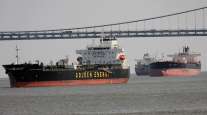Diesel Price Gains 1.3¢ to $3.913; Crude Surges on Syria Concerns
This story appears in the Sept. 2 print edition of Transport Topics.
Retail diesel prices gained 1.3 cents last week to $3.913 a gallon, the Department of Energy reported, while crude oil rose to its highest level in more than two years on concerns about potential Western military action against Syria.
The increase in the national diesel average followed a 0.4-cent gain the previous week, DOE said after its Aug. 26 price report. Despite the increases, the diesel average is 17.6 cents lower than a year earlier, according to DOE data.
The agency also said the retail price of gasoline rose 0.2 cent a gallon to $3.552, ending a string of four declines. The average price is 22.4 cents below the corresponding week in 2012.
Analysts attributed the higher pump prices to recent increases in crude oil, which Aug. 28 closed at $110.10 a barrel on the New York Mercantile Exchange, the highest since May 2011. Oil has increased about 4% during August.
Crude prices eased some the following day, when an attack seemed less imminent, closing Aug. 29 at $108.80 a barrel compared with $105.03 a week earlier.
The Energy Department’s Energy Information Administration said crude stocks for the week ended Aug. 23 rose by 3 million barrels to 362.1 million barrels. In contrast, analysts had been expecting a slight fall in crude stockpiles.
Earlier in the month, oil prices rose after unrest in Egypt and labor disputes in Libya that cut oil production and shipments.
“They were down like 60% of their normal supply capacity,” said Sean Hill, an analyst at DOE’s Energy Information Administration. The increase in crude prices, though, was “pretty mild . . . as evidenced by the gas prices and diesel prices.”
But that was changing last week as the United States and its allies said they could take military action against Syria, which they accused of using chemical weapons on its citizens.
“The oil volatility really shot through the roof,” said Phil Flynn, an analyst with Price Futures Group in Chicago. “As soon as you’re done with Libya, now you got to worry about another country.
“The reason it’s so serious is not because Syria produces a lot of oil, but it’s the players that are on opposite sides of the conflict,” he said naming Russia, Iran, the United States and Saudi Arabia.
The conflict could spread to other Middle East countries or cause the closure of shipping channels, he warned.
Back in the United States, trucking executives said they were prepping for higher pump prices by focusing even more on fuel efficiency.
“With everything going on now, we’re going to see [higher prices],” said Micheal Jimenez, president and co-founder of J&L Transportation, an intermodal carrier based in Phoenix.
Jimenez said the company recently purchased eight new trucks with the latest aerodynamic design and fuel systems. The company, which runs 32 tractors, generally replaces 25% of its fleet each year, he said.
Other fuel-saving measures include using trailer skirts and ensuring tires are properly inflated. He said the company recently bought new trailers with tires that keep pressure at 100 pounds.
Jimenez, a past chairman of the Arizona Trucking Association, also said fuel surcharges cannot fully protect fleets from price spikes.
“We at least recoup costs associated directly to fuel, but any other costs associated with oil products, tires, lubricants and things like that, those are never recouped,” he said.
J&L is “at the mercy” of customers when it comes to whether it has weekly or monthly surcharge contracts, which also affects how much the company is hurt by rising fuel prices, Jimenez added.
A similar sentiment was echoed by Mark Walker, chairman of Transland Inc., a general freight carrier based in Springfield, Mo.
“There’s a limit to the amount of flexibility a company has,” said Walker, whose father Glendon founded the fleet of 160 power units and more than 350 trailers.
“It simply reinforces how important it is for us to go into the mileage-saving initiatives that we have been piloting like trailer skirts, and we just added 50 trailer tails onto our 50 new trailers,” Walker said.
He estimated adding the skirts into the fleet has lifted overall fuel economy to almost 7 mpg, up by as much as 0.5 mpg compared with two years ago.
Auxiliary power units have helped Transland reduce idling time to 10% and a fuel bonus program encourages drivers to control fuel consumption, Walker added.
Analysts Flynn and Hill each said ample oil supplies provide the United States with some cushion against global disruptions.
Crude stockpiles rose 2.99 million barrels last week, to 362 million, DOE said.
“If this had happened without the shale-gas revolution, if it didn’t happen at a time where global production has caught up with the demand side of the equation, crude oil would have gone up another 20, 30 bucks,” Flynn said.




